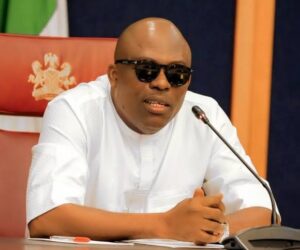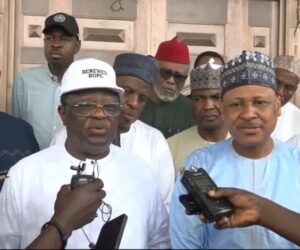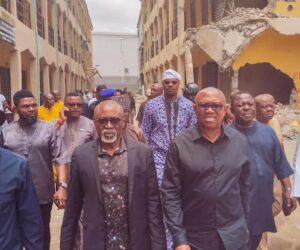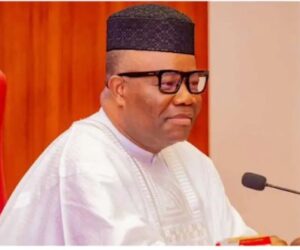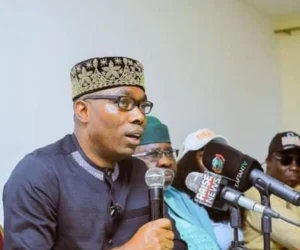In a move that could significantly reshape Nigeria’s electoral calendar and reduce post-election disputes, the National Assembly has proposed that the next presidential and governorship elections be held in November 2026, six months ahead of the traditional February-March schedule.
The proposal, contained in the draft amendments to the Electoral Act 2022, was unveiled on Monday during a one-day public hearing organised by the Joint Committee on Electoral Matters of the Senate and House of Representatives.
The amendment sought to ensure that all election litigations were concluded before the swearing-in of newly elected leaders on May 29, 2027.
If adopted, the change would mark a historic shift in Nigeria’s democratic timetable since 1999.
According to Section 4(7) of the proposed amendment, “Elections into the office of the President and Governor of a State shall be held not later than 185 days before the expiration of the term of office of the last holder of the office.”
A calculation of the 185-day period before May 29, 2027, indicates that both the presidential and gubernatorial elections would be conducted in November 2026.
Similarly, the amendment to Section 4(5) stipulates that, “Elections into the State Houses of Assembly and the National Assembly shall be held not later than 185 days before the date on which each of the Houses stands dissolved.”
Explaining the rationale, Chairman of the House Committee on Electoral Matters, Hon. Adebayo Balogun, said the adjustment was designed to “allow sufficient time for the resolution of all election petitions before swearing-in ceremonies.”
Balogun disclosed that the proposal would also require amendments to Section 285 of the 1999 Constitution, which prescribes timelines for election tribunal judgments, and Section 139, which relates to post-election disputes.
“We are proposing to shorten the duration for election litigations. Tribunals will now have 90 days instead of 180 to deliver judgments, while appellate courts will have 60 days,” he said.
The Supreme Court will also have its own window within the 185-day framework. This will ensure that no litigation lingers beyond the handover date.”
However, to accommodate the revised timeline, the joint committee proposed that Sections 76, 116, 132, and 178 of the Constitution, which currently fixed election periods, be amended to delegate the power of determining election timelines to the Electoral Act.
“Section 28, now Section 27 (5–7), was introduced to remove the determination of election timelines from the Constitution and vest it in the Electoral Act.”
This structural change, the lawmakers argued, would grant the Independent National Electoral Commission (INEC) greater flexibility in scheduling elections without constitutional constraints.
The public hearing also witnessed overwhelming support from stakeholders, including the Independent National Electoral Commission (INEC), civil society groups, journalists, and election observers, for the adoption of electronic voting and electronic transmission of results.
Representing INEC, Professor Abdullahi Zuru, endorsed the proposals, saying they would “enhance transparency, reduce human interference, and strengthen public confidence in the electoral process.”
Section 60(5) of the draft amendment mandated compulsory electronic transmission of results from polling units, while also preserving manual backup.
“The Presiding Officer shall transmit the results, including the total number of accredited voters, to the next level both electronically and manually,” the section states.
To deter malpractice, the amendment criminalised the distribution of unstamped ballot papers and result sheets, prescribing a one-year jail term or a fine of N1 million, or both, for erring officers.
Another significant innovation in the proposed legislation was the introduction of early voting, aimed at ensuring that Nigerians on electoral duty could still exercise their franchise.
“There shall be a date set aside for early voting not later than 14 days to the day of the election,” it stated.
Eligible categories included security personnel, INEC officials, accredited domestic observers, journalists, and ad-hoc staff, groups typically deployed on election duty and often disenfranchised under current arrangements.
The joint committee also recommended several other reforms to enhance electoral inclusiveness and efficiency.
These included non-compulsory use of the Permanent Voter Card (PVC), and allowing INEC-approved alternatives where necessary.
It also included tightened penalties for electoral offences, particularly those involving manipulation of results or obstruction of electronic systems and improved regulation of political parties’ primaries to ensure greater internal democracy.
Virtually all presenters at the hearing backed the National Assembly’s vision for earlier elections and stronger technological safeguards.
Many civil society representatives argued that the changes would reduce electoral tension, curb judicial manipulation, and promote smoother transitions of power.
INEC’s representative also commended the legislature for recognising the logistical realities of election management in Nigeria’s vast and diverse landscape.
“Conducting elections earlier will not only improve planning and litigation timelines but also reduce the risk of rushed inaugurations and post-swearing-in reversals,” Zuru said.
With the 2027 general election now barely two years away, the National Assembly’s proposed timeline marked one of the most ambitious electoral reforms since the return to civilian rule.
If adopted and harmonised with constitutional amendments, Nigeria’s next presidential and gubernatorial elections could hold in November 2026, with the hope that all petitions were resolved before May 29, 2027, ushering in a new era where no leader takes office under legal uncertainty.
The proposed reforms, expected to go through further scrutiny and debate in both chambers, had already sparked optimism that Nigeria’s democracy might be inching closer to a cleaner, faster, and more transparent electoral system.
Sunday Aborisade
Follow us on:



